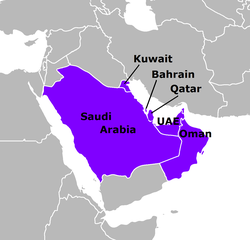Cooperation Council for the Arab States of the Gulf
|
مجلس التعاون لدول الخليج
Cooperation Council for the Arab States of the Gulf |
|
|---|---|

Flag
|
|

Map indicating CCASG members.
|
|
| Headquarters |
|
| Official languages | Arabic |
| Type | Trade bloc |
| Membership |
6 states
|
| Leaders | |
|
|
|
| Establishment | |
|
• As the GCC
|
25 May 1981 |
| Area | |
|
• Total
|
2,673,108 km2 (1,032,093 sq mi) |
|
• Water (%)
|
0.6 |
| Population | |
|
• 2014 estimate
|
50,761,260 |
|
• Density
|
17.37/km2 (45.0/sq mi) |
| GDP (nominal) | 2013 estimate |
|
• Total
|
US$3.264 trillion |
|
• Per capita
|
$33,005 |
| Currency |
Khaleeji (proposed) 6 currencies
|
|
Website
http://www.gcc-sg.org |
|
|
|
Khaleeji (proposed)
The Cooperation Council for the Arab States of the Gulf (Arabic: مجلس التعاون لدول الخليج), originally (and still colloquially) known as the Gulf Cooperation Council (GCC, مجلس التعاون الخليجي), is a regional intergovernmental political and economic union consisting of all Arab states of the Persian Gulf, except for Iraq. Its member states are Bahrain, Kuwait, Oman, Qatar, Saudi Arabia, and the United Arab Emirates.
All current member states are monarchies, including three constitutional monarchies (Qatar, Kuwait, and Bahrain), two absolute monarchies (Saudi Arabia and Oman), and one federal monarchy (the United Arab Emirates, composed of seven member states, each with its own emir). There have been discussions regarding the future membership of Jordan, Morocco, and Yemen.
A 2011 proposal to transform the GCC into a "Gulf Union" with tighter economic, political and military coordination has been advanced by Saudi Arabia, a move meant to counterbalance the Iranian influence in the region. Objections have been raised against the proposal by other countries. In 2014, Bahrain prime minister Khalifa bin Salman Al Khalifa said that current events in the region highlighted the importance of the proposal.
...
Wikipedia
